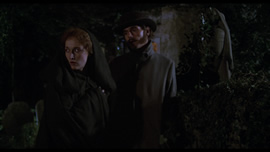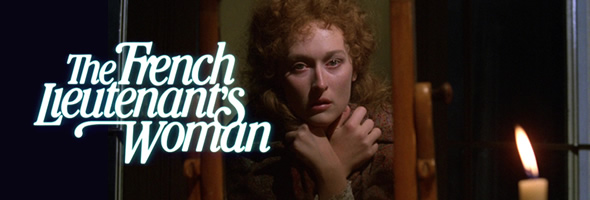
Color, 1981, 123m.
Directed by Karel Reisz
Starring Meryl Streep, Jeremy Irons, Lynsey Baxter, Hilton McRae, Emily Morgan, Charlotte Mitchell, Peter Vaughan, Leo McKern
Criterion (Blu-ray & DVD) (US RA/R1 HD/NTSC), MGM (DVD, worldwide), Koba (Blu-ray & DVD) (France RB/R2 HD/PAL) / WS (1.85:1) (16:9)
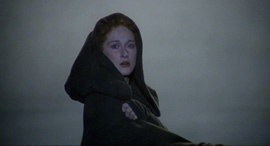
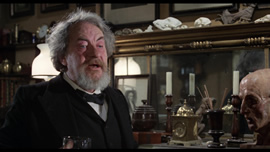 An unlikely public success as both a book and a screen adaptation, The French Lieutenant's Woman began life in 1969 as a novel by John Fowles, using his dense knowledge of Victorian literature to create a postmodern look at the era through a complex relationship between an abandoned woman and her engaged suitor. Fowles's tricky use of narrative voice and innovative literary devices had challenged filmmakers before, with William Wyler's The Collector telescoping its dual narrators into a chilling tale of claustrophobic terror and Fowles himself stumbling with his own adaptation of The Magus into an ill-fated film by Guy Green. However, this particular novel was widely deemed unfilmable for over a decade as it passed through several backers and potential directors, with challenges ranging from its extensive footnotes and modern narrator to its use of three endings. Director Karel Reisz, who had scored critical hits with his last two films (The Gambler and Who'll Stop the Rain), came up with a novel idea of tackling the problem: by framing the story within the novel as a film being made by two actors whose own experience of bringing this same book to life provides a modern perspective on the unfolding events. The concept was seized upon by screenwriter Harold Pinter, who was no stranger to tackling challenging literary source material thanks to The Last Tycoon a few years earlier.
An unlikely public success as both a book and a screen adaptation, The French Lieutenant's Woman began life in 1969 as a novel by John Fowles, using his dense knowledge of Victorian literature to create a postmodern look at the era through a complex relationship between an abandoned woman and her engaged suitor. Fowles's tricky use of narrative voice and innovative literary devices had challenged filmmakers before, with William Wyler's The Collector telescoping its dual narrators into a chilling tale of claustrophobic terror and Fowles himself stumbling with his own adaptation of The Magus into an ill-fated film by Guy Green. However, this particular novel was widely deemed unfilmable for over a decade as it passed through several backers and potential directors, with challenges ranging from its extensive footnotes and modern narrator to its use of three endings. Director Karel Reisz, who had scored critical hits with his last two films (The Gambler and Who'll Stop the Rain), came up with a novel idea of tackling the problem: by framing the story within the novel as a film being made by two actors whose own experience of bringing this same book to life provides a modern perspective on the unfolding events. The concept was seized upon by screenwriter Harold Pinter, who was no stranger to tackling challenging literary source material thanks to The Last Tycoon a few years earlier.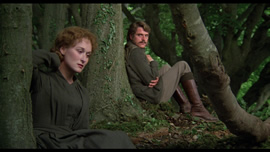 the woods where she spends solitary afternoons and offers a friendly ear, which turns into a series of encounters in which she reveals the full circumstances of her past and the fragile nature of her position in local society. An inappropriate misstep in the town of Lyme Regis can result in disaster, with the elderly in particular holding harsh,
the woods where she spends solitary afternoons and offers a friendly ear, which turns into a series of encounters in which she reveals the full circumstances of her past and the fragile nature of her position in local society. An inappropriate misstep in the town of Lyme Regis can result in disaster, with the elderly in particular holding harsh, 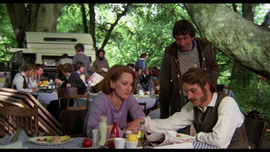 unflinching attitudes about the animalistic nature of life in the streets. Gradually Charles tries to unravel whether Sarah is really in love with the idea of being tormented or whether there's a deeper issue at work, and the influence of Sarah turns out to have long-standing consequences on his own personal life. Interspersed with this story is its creation as a film by actors Anna and Mike (Streep and Irons as well), who are having an affair and offering a different angle on the characters as revelations about them dovetail with the tumultuous story of Sarah and Charles.
unflinching attitudes about the animalistic nature of life in the streets. Gradually Charles tries to unravel whether Sarah is really in love with the idea of being tormented or whether there's a deeper issue at work, and the influence of Sarah turns out to have long-standing consequences on his own personal life. Interspersed with this story is its creation as a film by actors Anna and Mike (Streep and Irons as well), who are having an affair and offering a different angle on the characters as revelations about them dovetail with the tumultuous story of Sarah and Charles.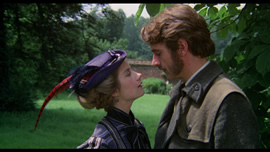 help create a haunting atmosphere that lingers long after the closing credits.
help create a haunting atmosphere that lingers long after the closing credits.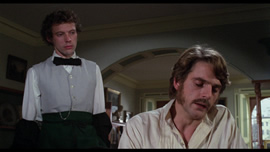 puzzle of the novel's ending(s). More interestingly, the Victorian story and the modern one never really intrude on one another (unless you count the clapboard in the opening shot), creating some ambiguity about whether we are in fact watching the exact film being made. The bulk of the modern story is limited to the two actors, who essentially offer a running commentary on the film before that concept quite existed, and only gradually do crew members and other actors intrude on the action for a climactic garden party. The cumulative effect is fascinating, creating a sort of mirror effect that enhances the main drama of the story rather than distancing the viewer from it. As an adaptation it also remains one of the more audacious gambles in movie history; in the wrong hands, the whole thing could have exploded disastrously. Interestingly, the changes from the novel are generally sound ones but the choice to omit a crucial undelivered letter creates an entirely different level of ambiguity for Sarah's character than what existed on the printed page. The decision to drop this (admittedly overused) bit of Victorian plot manipulation is a tantalizing one that gives the happier of the two resolutions an eerie, mysterious quality in retrospect.
puzzle of the novel's ending(s). More interestingly, the Victorian story and the modern one never really intrude on one another (unless you count the clapboard in the opening shot), creating some ambiguity about whether we are in fact watching the exact film being made. The bulk of the modern story is limited to the two actors, who essentially offer a running commentary on the film before that concept quite existed, and only gradually do crew members and other actors intrude on the action for a climactic garden party. The cumulative effect is fascinating, creating a sort of mirror effect that enhances the main drama of the story rather than distancing the viewer from it. As an adaptation it also remains one of the more audacious gambles in movie history; in the wrong hands, the whole thing could have exploded disastrously. Interestingly, the changes from the novel are generally sound ones but the choice to omit a crucial undelivered letter creates an entirely different level of ambiguity for Sarah's character than what existed on the printed page. The decision to drop this (admittedly overused) bit of Victorian plot manipulation is a tantalizing one that gives the happier of the two resolutions an eerie, mysterious quality in retrospect.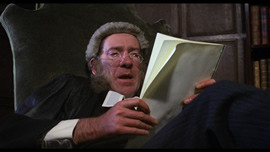 over the older HD master used for that French version and broadcasts on MGM HD; the film grain is tighter and more detailed, dark scenes more depth, and on the whole it's hard to imagine how it could look much better. Equally impressive is the LPCM mono audio (with optional English subtitles), which sounds more robust than the DVD by a long shot with able support for Davis's score.
over the older HD master used for that French version and broadcasts on MGM HD; the film grain is tighter and more detailed, dark scenes more depth, and on the whole it's hard to imagine how it could look much better. Equally impressive is the LPCM mono audio (with optional English subtitles), which sounds more robust than the DVD by a long shot with able support for Davis's score. 